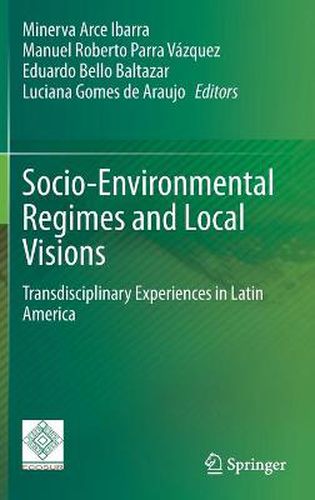Readings Newsletter
Become a Readings Member to make your shopping experience even easier.
Sign in or sign up for free!
You’re not far away from qualifying for FREE standard shipping within Australia
You’ve qualified for FREE standard shipping within Australia
The cart is loading…






This title is printed to order. This book may have been self-published. If so, we cannot guarantee the quality of the content. In the main most books will have gone through the editing process however some may not. We therefore suggest that you be aware of this before ordering this book. If in doubt check either the author or publisher’s details as we are unable to accept any returns unless they are faulty. Please contact us if you have any questions.
This book presents oral histories, collective dialogues, and analyses of rural and indigenous livelihoods facing global socio-environmental regime change in Latin America (LA). Since the late twentieth century, rural and indigenous producers in LA, including agriculturists, coffee-growers, as well as small-scale farmers/fishers, and others, have had to resist, cope with, or adapt to a range of neoliberal socio-environmental regimes that impact their territories and associated resources, including water, production systems and ultimately their cultural traditions. In response, rural producers are using local visions and innovation niches to decide what, when, and how to resist, cope with uncertainty, and still be successful in using their customary laws to retain their land rights and livelihoods. This book presents a range of ethnically diverse case studies from LA, which addresses socio-environmental, educational, and law regimes’ effects using transdisciplinary research approaches in rural, traditional and indigenous production systems. Based on both, the results and insights gained into how producers are resisting and adapting to these regimes, as well as decades of research carried out in LA rural territories by the participating authors, the book puts forward a baseline for devising new public policies that are better suited to the real challenges of livelihoods, poverty, and environmental degradation in LA. These recommendations are rooted in post-development thinking; they promote territorial public policy with social inclusion and a human’s rights approach.
The book draws on over 20 years of research carried out by LA’s academics and their undergraduate and graduate students who have addressed collaborative work, participatory research, and transdisciplinary approaches with rural commons and communities in LA. It features 19 case studies, with contributions from Argentina, Bolivia, Brazil, Colombia, Cuba, Honduras, and Mexico.
$9.00 standard shipping within Australia
FREE standard shipping within Australia for orders over $100.00
Express & International shipping calculated at checkout
This title is printed to order. This book may have been self-published. If so, we cannot guarantee the quality of the content. In the main most books will have gone through the editing process however some may not. We therefore suggest that you be aware of this before ordering this book. If in doubt check either the author or publisher’s details as we are unable to accept any returns unless they are faulty. Please contact us if you have any questions.
This book presents oral histories, collective dialogues, and analyses of rural and indigenous livelihoods facing global socio-environmental regime change in Latin America (LA). Since the late twentieth century, rural and indigenous producers in LA, including agriculturists, coffee-growers, as well as small-scale farmers/fishers, and others, have had to resist, cope with, or adapt to a range of neoliberal socio-environmental regimes that impact their territories and associated resources, including water, production systems and ultimately their cultural traditions. In response, rural producers are using local visions and innovation niches to decide what, when, and how to resist, cope with uncertainty, and still be successful in using their customary laws to retain their land rights and livelihoods. This book presents a range of ethnically diverse case studies from LA, which addresses socio-environmental, educational, and law regimes’ effects using transdisciplinary research approaches in rural, traditional and indigenous production systems. Based on both, the results and insights gained into how producers are resisting and adapting to these regimes, as well as decades of research carried out in LA rural territories by the participating authors, the book puts forward a baseline for devising new public policies that are better suited to the real challenges of livelihoods, poverty, and environmental degradation in LA. These recommendations are rooted in post-development thinking; they promote territorial public policy with social inclusion and a human’s rights approach.
The book draws on over 20 years of research carried out by LA’s academics and their undergraduate and graduate students who have addressed collaborative work, participatory research, and transdisciplinary approaches with rural commons and communities in LA. It features 19 case studies, with contributions from Argentina, Bolivia, Brazil, Colombia, Cuba, Honduras, and Mexico.